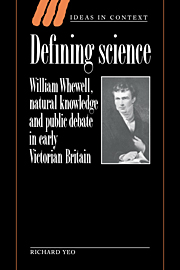9 - The unity of science
Published online by Cambridge University Press: 22 August 2009
Summary
I have been once to the top of Snowden but as you will find if ever you take to mountain climbing the most picturesque part of a mountain is by no means its top.
Whewell to his sister, 9 September 1818, WP, Add. MS. a. 301At the time of the foundation of the British Association there was anxiety about the fragmentation of the ‘commonwealth of science’. Whewell coined the term ‘scientist’ in this context; and in spite of the fact that Faraday and others had begun to demonstrate the connections between various physical forces, these concerns continued. As President in 1859, Prince Albert feared that specialization would weaken the ‘consciousness of its unity which must pervade the whole of Science’ (Albert, Prince Consort 1859, lxiii). Later commentators such as Todhunter and James Clerk Maxwell regarded Whewell's work as a counterweight to this tendency:
He [Whewell] did not despair of the fortunes of knowledge; he held that real connexions must subsist among the apparent infinite mass of details, and he encouraged investigators to seek for such general ideas in all their occupations. The lessons which he explicitly taught and implicitly suggested seem peculiarly useful at the present day when every pursuit is specialized. (Todhunter 1876, 1, 112; also Maxwell 1876, 206)
Possibly as another sign of resistance, the intellectual landscape of the nineteenth century was marked by some large synthetic systems.
- Type
- Chapter
- Information
- Defining ScienceWilliam Whewell, Natural Knowledge and Public Debate in Early Victorian Britain, pp. 231 - 255Publisher: Cambridge University PressPrint publication year: 1993

